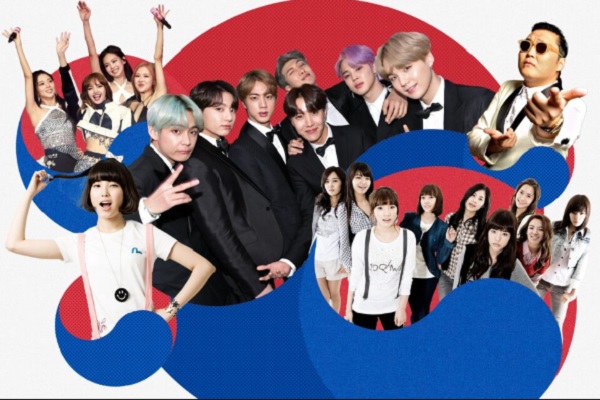
K-pop, the vibrant and infectious genre of South Korean pop music, has evolved into a global cultural phenomenon that generates billions of dollars for South Korea. Over the past decade, K-pop has gained massive popularity, transcending borders and making a significant impact on the global entertainment landscape. This rise has transformed K-pop into more than just music; it has become a cultural export that plays a vital role in South Korea’s economy. The billions of dollars that K-pop contributes come from a wide array of sectors, including music sales, concert tours, merchandise, tourism, and brand endorsements, as well as from the ripple effects of increased interest in other South Korean products and services.
One of the primary ways K-pop contributes to South Korea’s economy is through music sales and concert tours. K-pop groups like BTS, BLACKPINK, and EXO have achieved unprecedented success in both physical and digital music sales. Their albums, consistently topping international charts like the Billboard 200, rake in millions from global fans. Streaming platforms such as Spotify, Apple Music, and YouTube generate further revenue through their vast viewership and high streaming numbers. Moreover, K-pop artists embark on extensive world tours, performing in sold-out arenas across North America, Europe, and Asia. For instance, BTS’s "Love Yourself" world tour alone grossed over $200 million in ticket sales. These tours contribute not only through ticket sales but also through the sale of concert merchandise, VIP packages, and live streaming of performances, which attract millions of viewers worldwide.
Beyond music and performances, K-pop's influence extends into the lucrative world of merchandise and licensing. Fans, often referred to as "K-pop stans," are known for their deep loyalty and willingness to purchase a wide range of products related to their favorite idols. Official merchandise such as clothing, accessories, posters, and light sticks are sold in massive quantities, especially during concert tours and fan events. These items are often limited edition, driving demand and boosting sales both domestically and internationally. In addition to direct merchandise sales, K-pop idols frequently collaborate with major international brands for product endorsements and licensing deals. These partnerships are highly lucrative and help companies reach younger, global audiences. BTS, for example, has worked with brands like Samsung, McDonald’s, and Hyundai, leveraging their massive fanbase to generate millions in revenue for both the brands and the K-pop industry.
Tourism is another critical area where K-pop fuels South Korea’s economy. The global appeal of K-pop has transformed South Korea into a must-visit destination for international fans. K-pop enthusiasts travel to Seoul in droves to visit landmarks associated with their favorite idols, from the headquarters of major entertainment agencies to famous filming locations for K-pop music videos. Special fan events, such as meet-and-greets and K-pop festivals, attract tourists who spend on accommodation, food, transportation, and local shopping. In fact, "Hallyu tourism" (Hallyu meaning the "Korean Wave" of cultural popularity) has become a significant driver of the country's tourism industry, contributing to local businesses and boosting the hospitality and retail sectors.
Moreover, the success of K-pop has led to a "halo effect" that positively impacts other sectors of the South Korean economy. The global fascination with K-pop has fueled international interest in other South Korean cultural exports, such as K-beauty products, fashion, technology, and cuisine. K-pop idols often set trends in beauty and fashion, which leads to increased demand for South Korean skincare products, makeup, and clothing brands. Fans seek to emulate their favorite idols, further boosting sales of Korean exports. South Korean electronics companies like Samsung and LG have also benefited from the association with K-pop, as idols are often featured in their marketing campaigns, adding to the global exposure and demand for Korean products.
In addition to economic benefits, K-pop has enhanced South Korea’s soft power on the international stage. As K-pop artists continue to gain worldwide recognition, they help to shape a positive image of South Korea, strengthening its influence in global affairs. For example, BTS’s invitation to speak at the United Nations General Assembly in 2021 not only showcased their global impact but also underscored South Korea’s cultural reach. This soft power extends beyond music, as K-pop fosters greater interest in South Korean language, history, and traditions, thereby creating more opportunities for international partnerships in education, trade, and diplomacy.
Another way K-pop contributes to South Korea’s economy is through the success of entertainment companies that manage these idols. Major K-pop agencies like HYBE (BTS’s agency), SM Entertainment, and YG Entertainment have become global businesses with extensive investments, joint ventures, and partnerships worldwide. The IPO (initial public offering) of HYBE, for instance, raised over $800 million, making it one of South Korea’s most valuable companies. These agencies have expanded their reach by collaborating with international music labels and artists, further strengthening their global presence and creating additional revenue streams.
In conclusion, K-pop has grown into a multi-billion-dollar industry that significantly contributes to South Korea’s economy. From music sales and concerts to merchandise, tourism, and brand endorsements, K-pop’s influence is vast and far-reaching. The global phenomenon has not only enriched South Korea’s cultural landscape but also boosted the country’s international standing, economic growth, and cultural influence. As K-pop continues to expand its global fanbase, its economic impact on South Korea is likely to grow even further, solidifying its role as a key driver of the country’s cultural and economic success.
